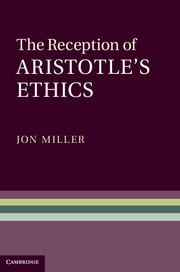Book contents
- The Reception of Aristotle's Ethics
- Contents
- Notes on contributors
- Acknowledgments
- A note on abbreviations and transliteration
- Introduction
- Chapter 1 The Nicomachean Ethics in Hellenistic philosophy
- Chapter 2 The transformation of Aristotle's ethics in Roman philosophy
- Chapter 3 Aristotelian ethics in Plotinus
- Chapter 4 St. Augustine's appropriation and transformation of Aristotelian eudaimonia
- Chapter 5 The Arabic and Islamic reception of the Nicomachean Ethics
- Chapter 6 Maimonides’ appropriation of Aristotle's ethics
- Chapter 7 The relation of prudence and synderesis to happiness in the medieval commentaries on Aristotle's ethics
- Chapter 8 Using Seneca to read Aristotle
- Chapter 9 Aristotle's Ethics in the Renaissance
- Chapter 10 The end of ends? Aristotelian themes in early modern ethics
- Chapter 11 Affective conflict and virtue
- Chapter 12 Kant and Aristotle on ethics
- Chapter 13 The fall and rise of Aristotelian ethics in Anglo-American moral philosophy
- Bibliography
- Index
Chapter 9 - Aristotle's Ethics in the Renaissance
Published online by Cambridge University Press: 05 February 2013
- The Reception of Aristotle's Ethics
- Contents
- Notes on contributors
- Acknowledgments
- A note on abbreviations and transliteration
- Introduction
- Chapter 1 The Nicomachean Ethics in Hellenistic philosophy
- Chapter 2 The transformation of Aristotle's ethics in Roman philosophy
- Chapter 3 Aristotelian ethics in Plotinus
- Chapter 4 St. Augustine's appropriation and transformation of Aristotelian eudaimonia
- Chapter 5 The Arabic and Islamic reception of the Nicomachean Ethics
- Chapter 6 Maimonides’ appropriation of Aristotle's ethics
- Chapter 7 The relation of prudence and synderesis to happiness in the medieval commentaries on Aristotle's ethics
- Chapter 8 Using Seneca to read Aristotle
- Chapter 9 Aristotle's Ethics in the Renaissance
- Chapter 10 The end of ends? Aristotelian themes in early modern ethics
- Chapter 11 Affective conflict and virtue
- Chapter 12 Kant and Aristotle on ethics
- Chapter 13 The fall and rise of Aristotelian ethics in Anglo-American moral philosophy
- Bibliography
- Index
Summary
When the Italian humanist Francis Petrarch (1304–1374) defended himself against certain followers of Aristotle in his On His Own Ignorance and That of Many Others, he contrasted the approach to ethics taken by ancient Latin writers (Cicero, Seneca, Horace) with that of Aristotle in his Nicomachean Ethics (henceforth Ethics). It was an unequal battle: although Aristotle offers a good definition of what virtue is, Petrarch says, “his lesson lacks the words that sting and set afire and urge toward love of virtue and hatred of vice or, at any rate, does not have enough of such power. He who looks for that will find it in our Latin writers […].” Petrarch went on to explain that “our Latin writers […] stamp and drive deep into the heart the sharpest and most ardent stings of speech, by which the lazy are startled, the ailing are kindled, and the sleepy aroused, the sick healed, and the prostrate raised, and those who stick to the ground lifted up to the highest thoughts and to honest desire.” Since virtues “must be not merely known but loved,” the “true moral philosophers” are
those who do not merely teach what virtue and vice are and hammer into our ears the brilliant name of the one and the grim name of the other but sow into our hearts love of the best and eager desire for it and at the same time hatred of the worst and how to flee it. It is safer to strive for a good and pious will than for a capable and clear intellect. The object of the will, as it pleases the wise, is to be good; that of the intellect is truth. It is better to will the good than to know the truth. […] Therefore, those are far wrong who consume their time in learning to know virtue instead of acquiring it […]
In other words, Petrarch was saying, a philosophical and abstract definition of virtue or treatment of ethics is not enough: it must be accompanied by powerful language which urges the reader on in his pursuit of what is good. The implication was that this dimension was lacking in Aristotle's work. He may have been good at identifying and defining virtue, but the Ethics does not actually fill the reader with desire for it.
- Type
- Chapter
- Information
- The Reception of Aristotle's Ethics , pp. 171 - 193Publisher: Cambridge University PressPrint publication year: 2012
- 5
- Cited by

